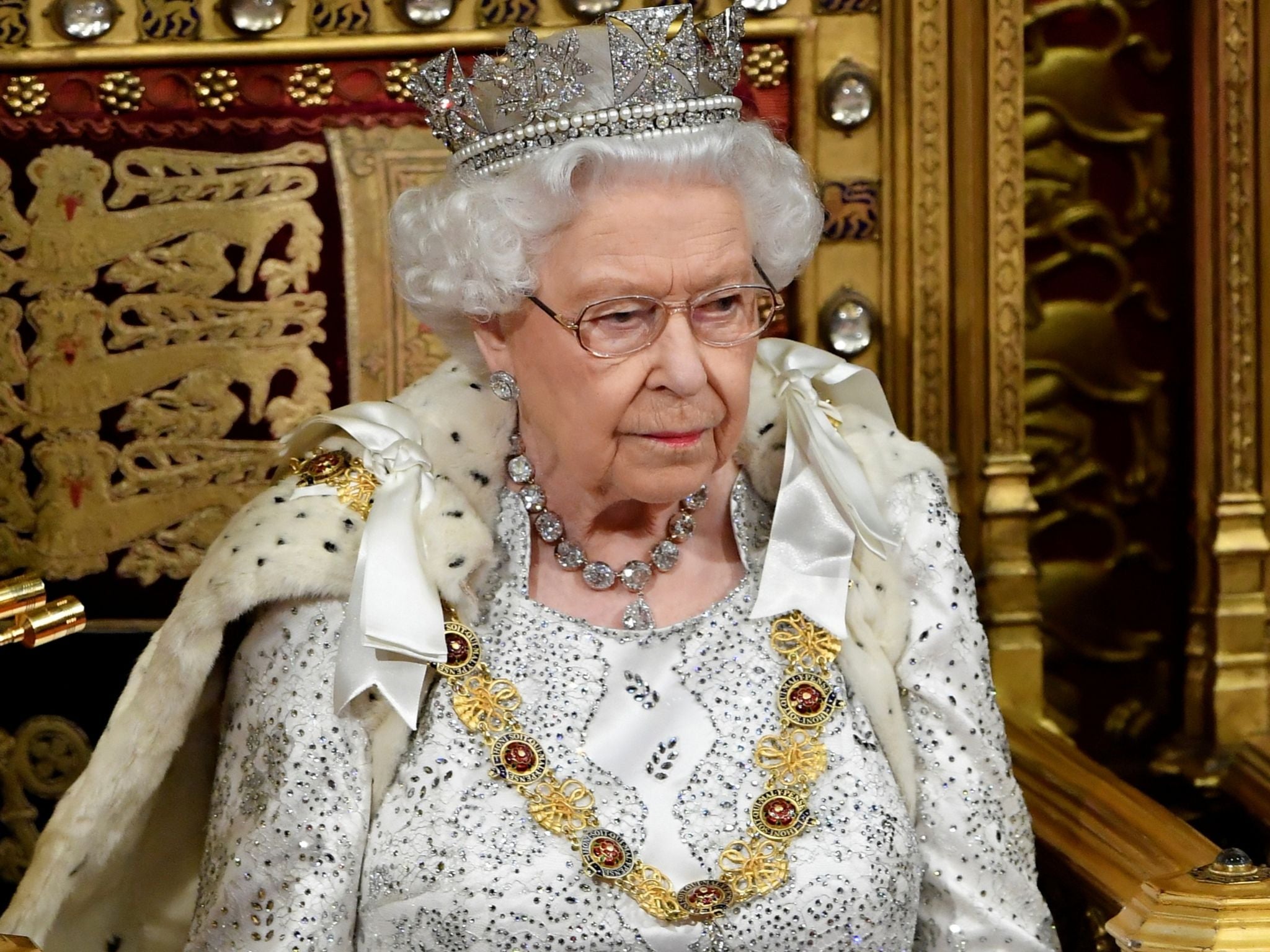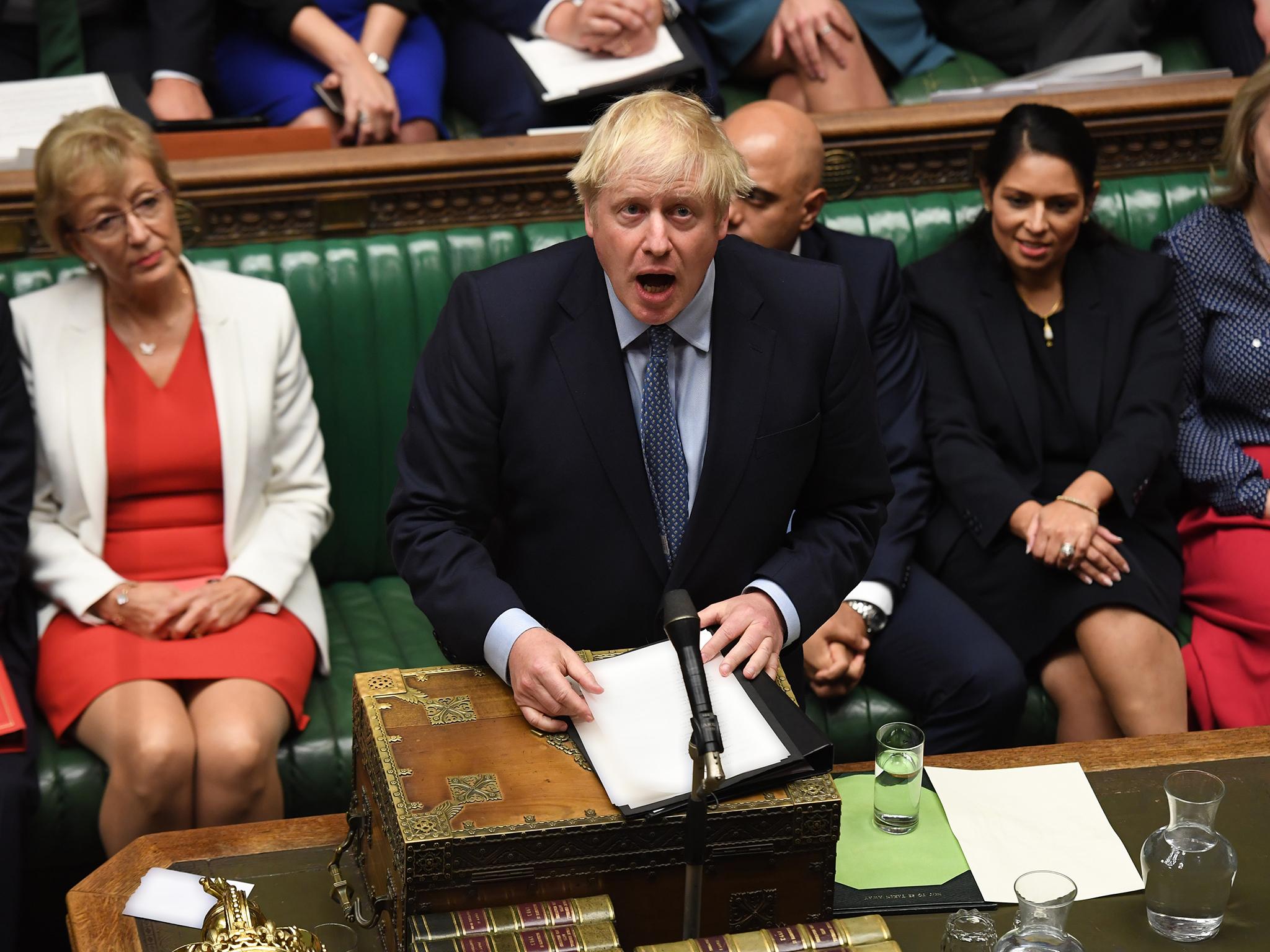Boris Johnson ‘heading for Queen’s Speech defeat and zombie government’
Opposition decry PM’s legislative agenda as electioneering stunt
Your support helps us to tell the story
From reproductive rights to climate change to Big Tech, The Independent is on the ground when the story is developing. Whether it's investigating the financials of Elon Musk's pro-Trump PAC or producing our latest documentary, 'The A Word', which shines a light on the American women fighting for reproductive rights, we know how important it is to parse out the facts from the messaging.
At such a critical moment in US history, we need reporters on the ground. Your donation allows us to keep sending journalists to speak to both sides of the story.
The Independent is trusted by Americans across the entire political spectrum. And unlike many other quality news outlets, we choose not to lock Americans out of our reporting and analysis with paywalls. We believe quality journalism should be available to everyone, paid for by those who can afford it.
Your support makes all the difference.Boris Johnson has been accused of leading a “zombie government” after Downing Street confirmed he will continue trying to push through his Queen’s Speech legislative programme even if it is rejected wholesale by the House of Commons.
The prime minister’s official spokesman flatly rejected suggestions that Mr Johnson would resign if the package is voted down by MPs next week, in what experts said was an “unprecedented” constitutional development likely to lead to a string of government defeats.
Mr Johnson’s spokesman said the PM – who is 45 MPs short of a working majority in the Commons – would press ahead with tabling the 26 bills contained in the Queen’s Speech and attempting to get them onto the statute book.
But Catherine Haddon of the Institute for Government think tank said that this was a recipe for legislative paralysis, telling The Independent: “If they can’t pass a Queen’s Speech then the likelihood of them passing any bills that don’t have cross-party support is very low.”
Dr Haddon said changes introduced by David Cameron meant it was no longer the case that defeat would trigger immediate resignation, as it did when Stanley Baldwin lost his Queen’s Speech in 1924.
But she added: “Losing the speech is still as important as it ever was, but because governments no longer have the ability to call an election unilaterally it changes how it all operates. It really is down to the political actors now to mark out what all the new conventions should be.”
Meanwhile, Downing Street indicated that Mr Johnson could defy any vote for a second Brexit referendum passed by MPs in an emergency sitting on Saturday.
Asked whether Mr Johnson would give his assent to the necessary motion approving spending on a public vote if MPs gave it their support, a source said only that the PM continues to believe that “we must respect the result of the referendum”.
“Zealots” calling for a referendum were “not interested in defending democracy, they are seeking to overturn it”, said the source. And he added: “Their aim has always been to delay and block Brexit for as long as possible so they could artificially engineer a second referendum. The public want Brexit done, no more delay, no more extension.”
The agenda set out by the monarch amid the traditional pomp of the state opening of parliament was dominated by measures needed to implement Brexit, including a withdrawal agreement bill which would have to be passed at breakneck speed to meet its promise to take the UK out of the EU by 31 October with a deal.

The government said the bill would not only meet the PM’s “do or die” Brexit deadline of the end of this month, but also ensure a deal featuring a “new protocol” for the Irish border to get rid of the controversial backstop.
In an apparent acknowledgement of the doubt hanging over a deal within the next 17 days, the Queen said only that “my government’s priority has always been to secure the United Kingdom’s departure from the EU on 31 October”.
But Downing Street dismissed suggestions that the palace had resisted having the sovereign say that Brexit “will” happen by the target date. Mr Johnson’s spokesman told reporters: “The language in the speech was the language suggested by the government.”
The programme set out as parliament reconvened after a brief prorogation included some measures that could be expected to go through with cross-party backing, such as legislation to crack down on domestic abuse, to ensure tips are passed on to staff in restaurants and to ban big game hunters from bringing “trophies” back to the UK.
But Mr Johnson was accused of using the Queen’s address to unveil a Conservative election manifesto, rather than a programme for government.
Among the bills announced were vote-grabbing plans for tougher sentencing of serious and sexual criminals, as well as an immigration bill to end freedom of movement and an environment bill to increase powers to tackle air pollution and introduce new charges on single-use plastic items.
The programme also included highly contentious legislation to require voters to show picture ID at polling stations, which opposition parties and campaigners warn will exclude thousands of people – particularly the vulnerable, disadvantaged and elderly – from taking part in elections, while doing little to counter fraud.
And there are also promises of future bills to accelerate improvements to the NHS, reform adult social care and modernise the treatment of people with mental health problems, at potentially huge financial cost.
Mr Johnson has made clear that he wants an early general election, and Labour leader Jeremy Corbyn has suggested he will trigger one as soon as it is certain that a no-deal Brexit has been averted, leading many in Westminster to believe Britain will go to the polls long before any of the measures have become law.
In comments which appeared to foreshadow his pitch for an imminent general election, the prime minister said his programme would “get this amazing country of ours moving again” and end the “stasis, gridlock and waiting for change” experienced in the three-and-a-half years since the 2016 referendum vote to leave the EU.
But shadow cabinet office minister Jon Trickett said: “Time and time again this zombie government has refused to listen to parliament or the public. Our communities are suffering as a result of Old Etonian arrogance.
“The country is crying out for a new start, which the Conservatives are incapable of providing. We need a Labour government to deliver the change so many people need.”

And Liberal Democrat leader Jo Swinson said: “This Queen’s Speech is a charade. There is nothing … that will bring comfort to the factory worker set to lose their job, or the families struggling to put food on the table because of his Brexit policy.”
CBI deputy director general Josh Hardie said the speech contained “a domestic vision that could excite enterprise and drive growth” through investment in science, infrastructure and education.
But Mr Hardie warned: “It is impossible to ignore the Brexit straightjacket. The reality of no-deal is that it would set the country back. To deliver the ambition set out in the Queen’s Speech, the will to get a deal must unlock a way to build a new, closely aligned relationship with the EU.”
Chancellor Sajid Javid announced plans for a budget just six days after the scheduled date for Brexit on 6 November, although aides said this would be delayed if no deal is reached.
Mr Javid said he would use the budget to “set out our plan to shape the economy and deliver our infrastructure revolution”, but his Labour shadow John Mc Donnell dismissed it as an “electioneering stunt”.

Join our commenting forum
Join thought-provoking conversations, follow other Independent readers and see their replies
Comments